July 2019
Sweaty Feet and Plantar Hyperhidrosis
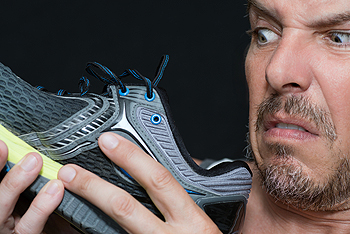 The medical condition that is referred to as plantar hyperhidrosis is indicative of excessively sweaty feet. Patients who have this condition have difficulty in keeping their feet dry for the majority of the day. This is often the result of large amounts of sweat that is produced by the sweat glands, and this can be an uncomfortable issue for patients who suffer from this condition. There are methods that can be implemented which may help to prevent plantar hyperhidrosis from developing. Using a foot powder that has antifungal properties may help to alleviate some of the odor that is often associated with this ailment. It may also be beneficial to wear shoes that are made of a breathable material, which may include leather or canvas. Additionally, it is important to regulate the body temperature, and this can be accomplished by drinking plenty of water for the majority of the day. If you feel you have this condition, it is advised that you seek the counsel of a podiatrist who can guide you toward beginning proper treatment.
The medical condition that is referred to as plantar hyperhidrosis is indicative of excessively sweaty feet. Patients who have this condition have difficulty in keeping their feet dry for the majority of the day. This is often the result of large amounts of sweat that is produced by the sweat glands, and this can be an uncomfortable issue for patients who suffer from this condition. There are methods that can be implemented which may help to prevent plantar hyperhidrosis from developing. Using a foot powder that has antifungal properties may help to alleviate some of the odor that is often associated with this ailment. It may also be beneficial to wear shoes that are made of a breathable material, which may include leather or canvas. Additionally, it is important to regulate the body temperature, and this can be accomplished by drinking plenty of water for the majority of the day. If you feel you have this condition, it is advised that you seek the counsel of a podiatrist who can guide you toward beginning proper treatment.
If you are suffering from hyperhidrosis contact the podiatrists of New England Family Foot Care. Our doctors can provide the care you need to attend to all of your foot and ankle needs.
Hyperhidrosis of the Feet
Hyperhidrosis is a rare disorder that can cause people to have excessive sweating of their feet. This can usually occur all on its own without rigorous activity involved. People who suffer from hyperhidrosis may also experience sweaty palms.
Although it is said that sweating is a healthy process meant to cool down the body temperature and to maintain a proper internal temperature, hyperhidrosis may prove to be a huge hindrance on a person’s everyday life.
Plantar hyperhidrosis is considered to be the main form of hyperhidrosis. Secondary hyperhidrosis can refer to sweating that occurs in areas other than the feet or hands and armpits. Often this may be a sign of it being related to another medical condition such as menopause, hyperthyroidism and even Parkinson’s disease.
In order to alleviate this condition, it is important to see your doctor so that they may prescribe the necessary medications so that you can begin to live a normal life again. If this is left untreated, it is said that it will persist throughout an individual’s life.
A last resort approach would be surgery, but it is best to speak with your doctor to find out what may be the best treatment for you.
If you have any questions please feel free to contact our office located in Milton, MA . We offer the newest diagnostic and treatment technologies for all your foot and ankle needs.
Signs You May Have Toenail Fungus
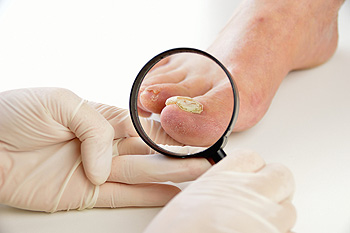 The symptoms of toenail fungus are fairly noticeable. An obvious sign that you may have developed this condition often includes a discoloration of the toenail. It will typically start with the big toenail, and will begin by turning a yellowish color. If it is not promptly treated, the nail may become brittle and crumble, and can gradually pull away from the toe. The fungus that causes this condition lives and thrives in warm and moist environments. These include public pools, locker rooms, and shower room floors. When appropriate shoes are worn, the chances of getting toenail fungus may be diminished. If you feel you have developed this condition, it is suggested to consult with a podiatrist who can properly diagnose and treat this condition.
The symptoms of toenail fungus are fairly noticeable. An obvious sign that you may have developed this condition often includes a discoloration of the toenail. It will typically start with the big toenail, and will begin by turning a yellowish color. If it is not promptly treated, the nail may become brittle and crumble, and can gradually pull away from the toe. The fungus that causes this condition lives and thrives in warm and moist environments. These include public pools, locker rooms, and shower room floors. When appropriate shoes are worn, the chances of getting toenail fungus may be diminished. If you feel you have developed this condition, it is suggested to consult with a podiatrist who can properly diagnose and treat this condition.
For more information about treatment, contact the podiatrists of New England Family Foot Care. Our doctors can provide the care you need to keep you pain-free and on your feet.
Toenail Fungus Treatment
Toenail fungus is a condition that affects many people and can be especially hard to get rid of. Fortunately, there are several methods to go about treating and avoiding it.
Antifungals & Deterrence
Oral antifungal medicine has been shown to be effective in many cases. It is important to consult with a podiatrist to determine the proper regiment for you, or potentially explore other options.
Applying foot powder on the feet and shoes helps keep the feet free of moisture and sweat.
Sandals or open toed shoes – Wearing these will allow air movement and help keep feet dry. They also expose your feet to light, which fungus cannot tolerate. Socks with moisture wicking material also help as well.
If you have any questions please feel free to contact our office located in Milton, MA . We offer the newest diagnostic tools and technology to treat your foot and ankle needs.
What Is the Purpose of the Achilles Tendon?
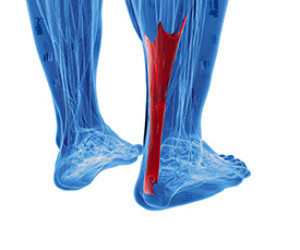 The largest tendon in the body is known as the Achilles tendon. Its function is to connect the heel bone to the calf muscles. Many tendons in the body are not flexible, and it is important to properly stretch this tendon before engaging in a sporting activity. If it should become irritated and inflamed, the result may be an Achilles tendon injury. The symptoms that are often associated with this type of injury can include tenderness, severe pain, discomfort, and the inability to bend the foot downward. If this tendon is not properly stretched, many people could tear their Achilles tendon if they start a new exercise regime, or increase the intensity considerably. There are numerous treatment options for this type of injury. If you feel you have injured your Achilles tendon, it is advised to consult with a podiatrist who can guide you toward the best treatment option.
The largest tendon in the body is known as the Achilles tendon. Its function is to connect the heel bone to the calf muscles. Many tendons in the body are not flexible, and it is important to properly stretch this tendon before engaging in a sporting activity. If it should become irritated and inflamed, the result may be an Achilles tendon injury. The symptoms that are often associated with this type of injury can include tenderness, severe pain, discomfort, and the inability to bend the foot downward. If this tendon is not properly stretched, many people could tear their Achilles tendon if they start a new exercise regime, or increase the intensity considerably. There are numerous treatment options for this type of injury. If you feel you have injured your Achilles tendon, it is advised to consult with a podiatrist who can guide you toward the best treatment option.
Achilles tendon injuries need immediate attention to avoid future complications. If you have any concerns, contact the podiatrists of New England Family Foot Care. Our doctors can provide the care you need to keep you pain-free and on your feet.
What Is the Achilles Tendon?
The Achilles tendon is a tendon that connects the lower leg muscles and calf to the heel of the foot. It is the strongest tendon in the human body and is essential for making movement possible. Because this tendon is such an integral part of the body, any injuries to it can create immense difficulties and should immediately be presented to a doctor.
What Are the Symptoms of an Achilles Tendon Injury?
There are various types of injuries that can affect the Achilles tendon. The two most common injuries are Achilles tendinitis and ruptures of the tendon.
Achilles Tendinitis Symptoms
- Inflammation
- Dull to severe pain
- Increased blood flow to the tendon
- Thickening of the tendon
Rupture Symptoms
- Extreme pain and swelling in the foot
- Total immobility
Treatment and Prevention
Achilles tendon injuries are diagnosed by a thorough physical evaluation, which can include an MRI. Treatment involves rest, physical therapy, and in some cases, surgery. However, various preventative measures can be taken to avoid these injuries, such as:
- Thorough stretching of the tendon before and after exercise
- Strengthening exercises like calf raises, squats, leg curls, leg extensions, leg raises, lunges, and leg presses
If you have any questions please feel free to contact our office located in Milton, MA . We offer the newest diagnostic tools and technology to treat your foot and ankle needs.
Are Flip Flops Dangerous to Wear?
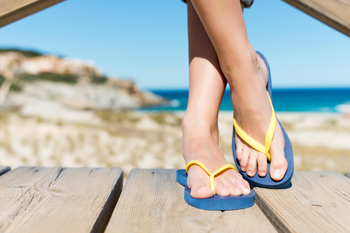 There are numerous people who enjoy the warm months of summer, and wearing flip flops is no exception. They are easy to wear, and are available in a multitude of colors. If they are worn for a minimum amount of time, there is typically limited damage that occurs. This type of shoe has no arch, and if they are worn frequently and for the majority of the day, the result may be overall foot pain. The plantar fascia may become sore, and this type of pain is felt on the bottom of the foot. Additionally, the toes will naturally grasp the top of the shoe so it can stay on the foot, and this can lead to strained ligaments. Some patients have endured ankle sprains, and the lack of support may cause the ankle to roll on one side. If you would like additional information about the dangers of wearing flip flops, please consult with a podiatrist.
There are numerous people who enjoy the warm months of summer, and wearing flip flops is no exception. They are easy to wear, and are available in a multitude of colors. If they are worn for a minimum amount of time, there is typically limited damage that occurs. This type of shoe has no arch, and if they are worn frequently and for the majority of the day, the result may be overall foot pain. The plantar fascia may become sore, and this type of pain is felt on the bottom of the foot. Additionally, the toes will naturally grasp the top of the shoe so it can stay on the foot, and this can lead to strained ligaments. Some patients have endured ankle sprains, and the lack of support may cause the ankle to roll on one side. If you would like additional information about the dangers of wearing flip flops, please consult with a podiatrist.
Flip-flops are not always the best choice of footwear. If you have any concerns about your feet or ankles, contact the podiatrists from New England Family Foot Care. Our doctors will assist you with all of your foot and ankle needs.
Flip-Flops and Feet
When the weather starts warming up, people enjoy wearing flip-flops. Flip-flops are comfortable, stylish, and easy to slip on and off; they're perfect for any summer beach goer. However, these shoes can cause harm to the feet.
How Can Flip-Flops Affect Me Long-Term?
- Ankle problems
- Hip problems
- Lower back problems
- Pain in the balls of the feet
- Problems with foot arches
- Changes in the way you walk
Are There Injuries Associated with Flip-Flops?
Yes. Since flip-flops are relatively weak and do not provide the same amount of support as sneakers, people who wear flip-flops regularly are more susceptible to injuries. On top of that, the open nature of the shoe makes your feet more prone to other problems, such as cuts and even infections. Common injuries and ailments include:
- Sprained ankles
- Blisters
- Infections
- Cuts and Scrapes
I like Wearing Flip-Flops. Are There Safe Alternatives?
When buying flip-flops, try to find ones that have sturdy soles and that are made of high-quality materials that will support for your feet. These flip-flops will cost more but will also last longer as a result.
If you have any questions please feel free to contact our office located in Milton, MA . We offer the newest diagnostic and treatment technologies for all your foot and ankle needs.
Read more about Flipping Out About Flip FlopsHeel Spur Facts
A heel spur is a bony protruding outgr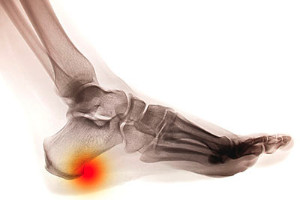 owth on the bone of the heel. They can be located either at the back of the heel or under it. Heel spurs located at the back of the heel are most often associated with inflammation of the Achilles tendon, which can cause tenderness and heel pain. Heel spurs will be diagnosed based on if you have a history of heel pain and if there is tenderness at the bottom of the heel. An X-Ray is typically required to confirm this. Some treatments for heel spurs include applying ice to the spot of the spur, orthotic devices or shoe inserts, anti-inflammatory medications such as Aleve and Advil, cortisone injections and sometimes surgery. Generally, heel spurs don’t lead to any long term conditions, as they usually respond well to the treatments mentioned previously. If you feel you may have developed a heel spur, it is advised that you go see a podiatrist.
owth on the bone of the heel. They can be located either at the back of the heel or under it. Heel spurs located at the back of the heel are most often associated with inflammation of the Achilles tendon, which can cause tenderness and heel pain. Heel spurs will be diagnosed based on if you have a history of heel pain and if there is tenderness at the bottom of the heel. An X-Ray is typically required to confirm this. Some treatments for heel spurs include applying ice to the spot of the spur, orthotic devices or shoe inserts, anti-inflammatory medications such as Aleve and Advil, cortisone injections and sometimes surgery. Generally, heel spurs don’t lead to any long term conditions, as they usually respond well to the treatments mentioned previously. If you feel you may have developed a heel spur, it is advised that you go see a podiatrist.
Heel spurs can be incredibly painful and sometimes may make you unable to participate in physical activities. To get medical care for your heel spurs, contact the podiatrists from New England Family Foot Care. Our doctors will do everything possible to treat your condition.
Heels Spurs
Heel spurs are formed by calcium deposits on the back of the foot where the heel is. This can also be caused by small fragments of bone breaking off one section of the foot, attaching onto the back of the foot. Heel spurs can also be bone growth on the back of the foot and may grow in the direction of the arch of the foot.
Older individuals usually suffer from heel spurs and pain sometimes intensifies with age. One of the main condition's spurs are related to is plantar fasciitis.
Pain
The pain associated with spurs is often because of weight placed on the feet. When someone is walking, their entire weight is concentrated on the feet. Bone spurs then have the tendency to affect other bones and tissues around the foot. As the pain continues, the feet will become tender and sensitive over time.
Treatments
There are many ways to treat heel spurs. If one is suffering from heel spurs in conjunction with pain, there are several methods for healing. Medication, surgery, and herbal care are some options.
If you have any questions feel free to contact our office located in Milton, MA . We offer the latest in diagnostic and treatment technology to meet your needs.
Painful Gout Attacks
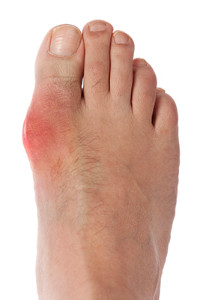 People who experience gout flare ups are aware of the severe pain and discomfort that often accompanies these attacks. It will typically affect the big toe, and common symptoms can include redness, swelling, and tenderness. A medical condition that is referred to as hyperuricemia can occur if there is excess uric acid in the bloodstream. This can happen for a variety of reasons, including having high blood pressure, being diabetic or obese. There are specific foods that have elevated purine levels, and if these are consumed, a surplus of uric acid levels may form in the blood. These can include red meat, shellfish, and foods or drinks that have excess sugar. There are methods that can be implemented which may help to prevent gout attacks. These consist of changing your eating habits to incorporate healthy foods, performing a gentle exercise routine, and to lose any existing additional weight. If you are afflicted with gout, it is suggested to speak with a podiatrist who can properly help you to manage this condition.
People who experience gout flare ups are aware of the severe pain and discomfort that often accompanies these attacks. It will typically affect the big toe, and common symptoms can include redness, swelling, and tenderness. A medical condition that is referred to as hyperuricemia can occur if there is excess uric acid in the bloodstream. This can happen for a variety of reasons, including having high blood pressure, being diabetic or obese. There are specific foods that have elevated purine levels, and if these are consumed, a surplus of uric acid levels may form in the blood. These can include red meat, shellfish, and foods or drinks that have excess sugar. There are methods that can be implemented which may help to prevent gout attacks. These consist of changing your eating habits to incorporate healthy foods, performing a gentle exercise routine, and to lose any existing additional weight. If you are afflicted with gout, it is suggested to speak with a podiatrist who can properly help you to manage this condition.
Gout is a foot condition that requires certain treatment and care. If you are seeking treatment, contact the podiatrists from New England Family Foot Care. Our doctors will treat your foot and ankle needs.
What Is Gout?
Gout is a type of arthritis caused by a buildup of uric acid in the bloodstream. It often develops in the foot, especially the big toe area, although it can manifest in other parts of the body as well. Gout can make walking and standing very painful and is especially common in diabetics and the obese.
People typically get gout because of a poor diet. Genetic predisposition is also a factor. The children of parents who have had gout frequently have a chance of developing it themselves.
Gout can easily be identified by redness and inflammation of the big toe and the surrounding areas of the foot. Other symptoms include extreme fatigue, joint pain, and running high fevers. Sometimes corticosteroid drugs can be prescribed to treat gout, but the best way to combat this disease is to get more exercise and eat a better diet.
If you have any questions please feel free to contact our office located in Milton, MA . We offer the newest diagnostic and treatment technologies for all your foot and ankle needs.








